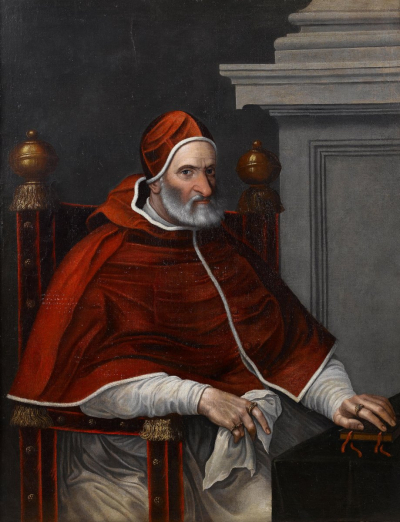The Council of Trent (Latin: Concilium Tridentinum), held between 1545 and 1563 in Trent (or Trento, in northern Italy), was the 19th ecumenical council of the Catholic Church. Prompted by the Protestant Reformation, it has been described as the embodiment of the Counter-Reformation.The Council issued condemnations of what it defined to be heresies committed by proponents of Protestantism, and also issued key statements and clarifications of the Church's doctrine and teachings, including scripture, the Biblical canon, sacred tradition, original sin, justification, salvation, the sacraments, the Mass, and the veneration of saints. The Council met for twenty-five sessions between 13 December 1545 and 4 December 1563. Pope Paul III, who convoked the Council, oversaw the first eight sessions (154547), while the twelfth to sixteenth sessions (155152) were overseen by Pope Julius III and the seventeenth to twenty-fifth sessions (156263) by Pope Pius IV.
The consequences of the Council were also significant with regard to the Church's liturgy and practices. In its decrees, the Council made the Latin Vulgate the official Biblical text of the Roman Church (without prejudice to the original texts in Hebrew and Greek, nor to other traditional translations of the Church, but favoring the Latin language over vernacular translations, such as the controversial English-language Tyndale Bible). In doing so, they commissioned the creation of a revised and standardized Vulgate in light of textual criticism, although this was not achieved until the 1590s. The council also officially affirmed (and for the first time at an ecumenical council) the traditional Catholic canon of biblical books, in response to Protestant exclusion of the deuterocanonical books. In 1565, a year after the Council finished its work, Pius IV issued the Tridentine Creed (after Tridentum, Trent's Latin name) and his successor Pius V then issued the Roman Catechism and revisions of the Breviary and Missal in, respectively, 1566, 1568 and 1570. These, in turn, led to the codification of the Tridentine Mass, which remained the Church's primary form of the Mass for the next four hundred years.
More than three hundred years passed until the next ecumenical council, the First Vatican Council, was convened in 1869.
Pope Pius IV (Italian: Pio IV; 31 March 1499 – 9 December 1565), born Giovanni Angelo Medici, was head of the Catholic Church and ruler of the Papal States from 25 December 1559 to his death in 1565. Born in Milan, his family considered itself a branch of the House of Medici and used the same coat of arms. Although modern historians have found no proof of this connection, the Medici of Florence recognized the claims of the Medici of Milan in the early 16th century.Pope Paul III appointed Medici Archbishop of Ragusa, and sent him on diplomatic missions to Germany and Hungary. He presided over the final session of the Council of Trent. His nephew, Cardinal Charles Borromeo, was a close adviser. As pope, Pius IV initiated a number of building projects in Rome, including one to improve the water supply.

1562Jan, 18
Pope Pius IV reopens the Council of Trent for its third and final session.
Choose Another Date
Events on 1562
- 17Jan
Edict of Saint-Germain
France recognizes the Huguenots by the Edict of Saint-Germain. - 18Jan
Council of Trent
Pope Pius IV reopens the Council of Trent for its third and final session. - 1Mar
Massacre of Wassy
Sixty-three Huguenots are massacred in Wassy, France, marking the start of the French Wars of Religion.

 English
English  español
español  français
français  português
português  русский
русский  العربية
العربية  简体中文
简体中文 